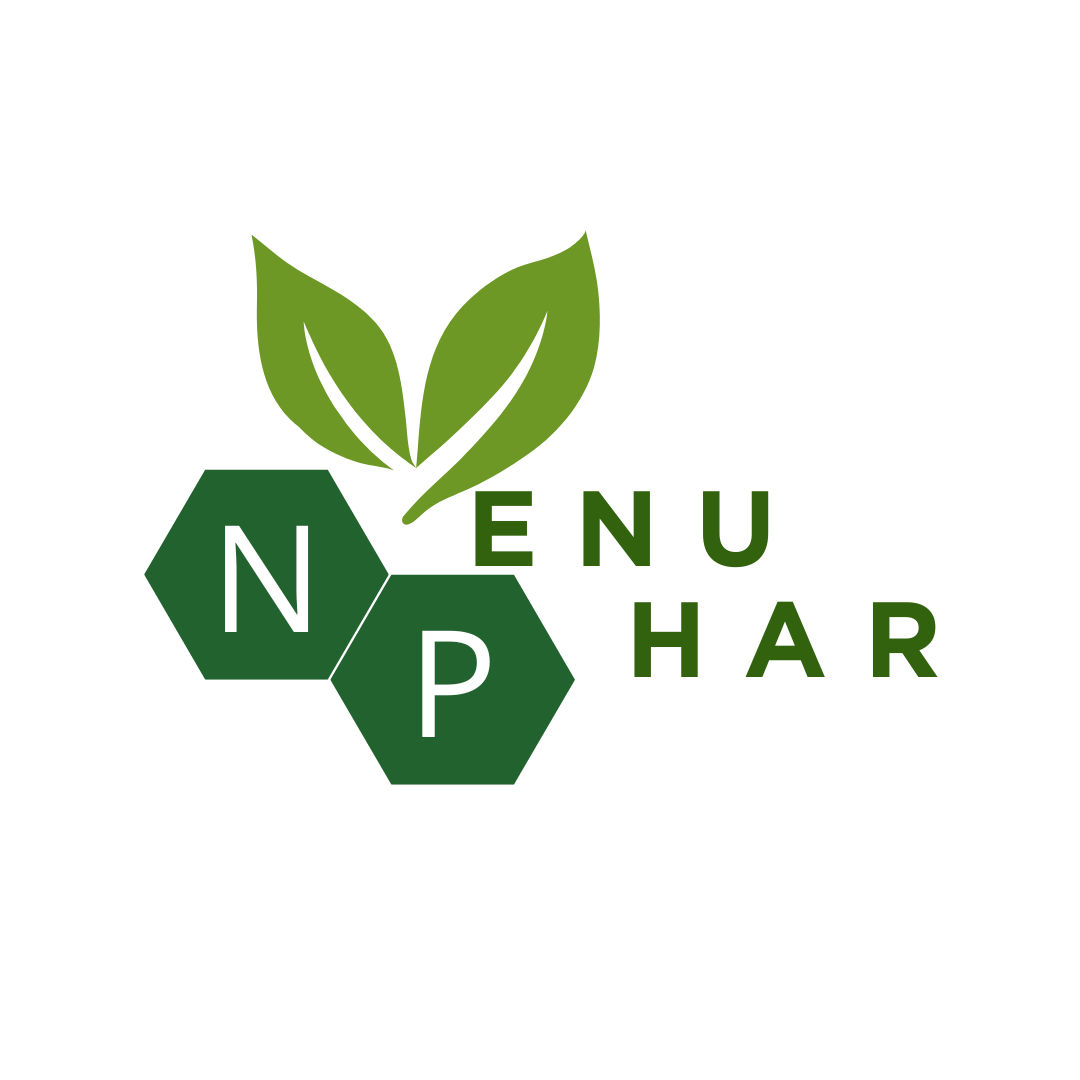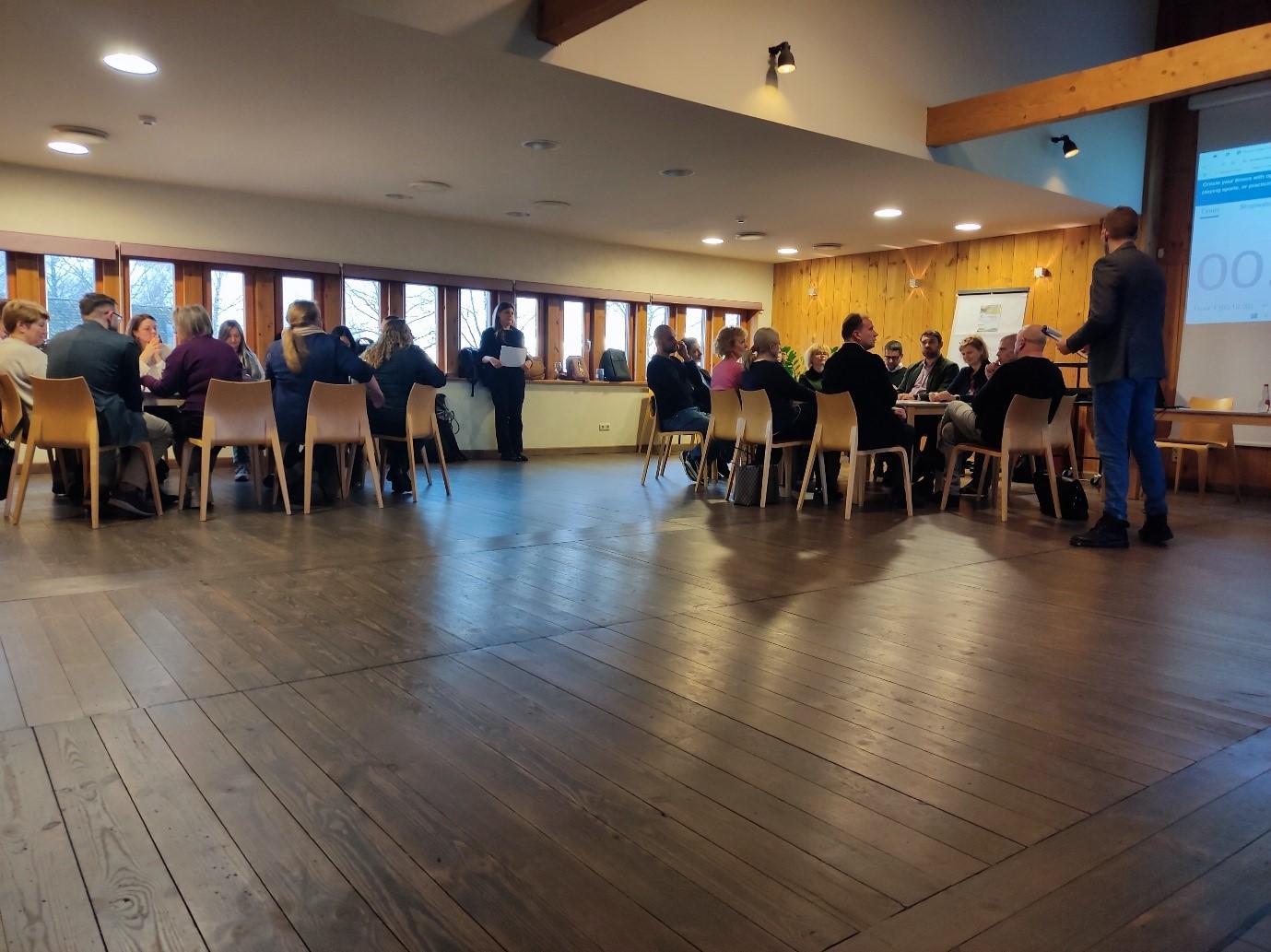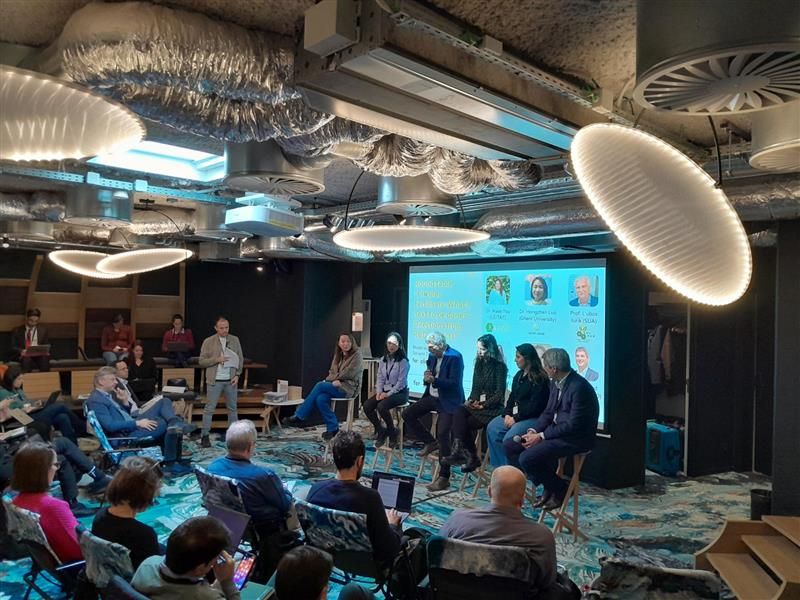Dear colleagues, friends, and interested readers,
In our second newsletter, we mark a full year since the launch of the NENUPHAR project! From exciting demo case developments to high-level conferences, in-person meetings in Brussels, dynamic workshops and new project partnerships, in the last six months we’ve been busy. As mentioned in our previous edition, since we only have two of these per year, expect a longer read – enjoy!
P.s. If you haven’t already, check out the NENUPHAR website, follow us on on socials and share among your networks! (LinkedIn, X, YouTube)

The EEB hosted the NENUPHAR team in Brussels for our annual General Assembly meeting (September 2024)
Composting in the Lielupe river basin
Recent months in the Lielupe river basin have been hands-on! In September, NENUPHAR partners ZEMNIEKU SAEIMA (ZSA), Latvian Water and Wastewater Works Association (LUKA) and the Latvian University of Life Sciences and Technologies (LBTU) carried out their first demo case activities by spreading and incorporating high-quality and tested sewage sludge compost on three fields in Latvia. To make this happen, partners engaged closely with farmers, agreeing on the requirements for the compost, the criteria for selecting farms, and the analysis/monitoring plan.
Overall, six fields were expertly selected in Latvia – three of which are being used for applying composted sewage sludge as a fertilizer, and three more for use as reference fields. All six fields are being monitored and the results of analysis will be compared. More on this soon…

Delivered sewage sludge compost (photo by Sandis Dejus, LUKA)
Keeping poop in the loop
While it’s not something we often think of, human waste has the potential to play a major role in the circular economy, and the NENUPHAR project is dedicated to focusing on this waste stream in the development of agricultural fertilizer!
As NENUPHAR’s sewage sludge experts, the Latvian Water and Wastewater Works Association (LUKA) team has been key in sourcing quality sewage sludge compost and ensuring that composting is carried out according to best practices.
Soil sampling and analysis of each field’s chemical composition was done by LBTU partners before applying the compost. All fields are located within approximately 50 km from each other; demonstration fields range from 6 to 9 ha, while reference fields range from 2 to 42 ha. In this major operation, 20 trucks delivered a total of 500 tonnes of compost to the demo fields!
After integrating the compost, the farmers successfully sowed the winter wheat crops in the demo fields and are informing NENUPHAR partners of their activities in all monitored fields. Watch this space…
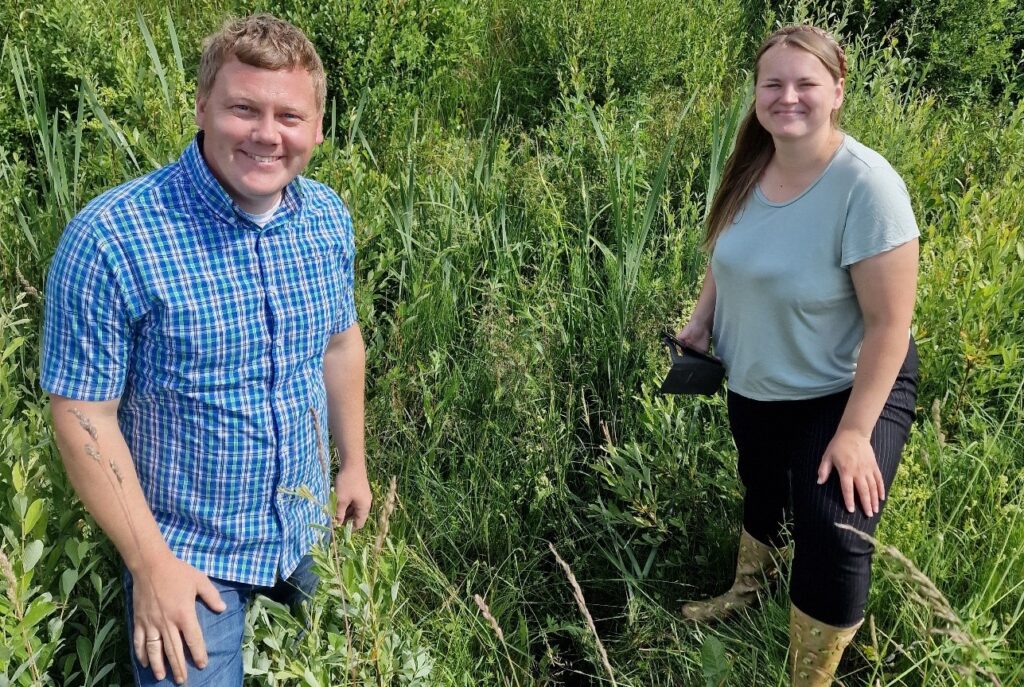
Field selection – Ainis Lagzdiņš and Olga Šķiste are verifying drainage system outlets (Photo by Dārta Gātere, ZSA)
A bumpy ride
So far, the demo implementation has been a success! However, partners have learnt this has not been without its challenges – for instance, the practical complexity… Since farming is highly dependent on weather conditions and other factors, it is difficult to precisely plan when to spread the biobased fertilizer (BBF) (in this case – composted sewage sludge). Therefore, organising the loading, delivery, unloading, spreading, and incorporation of the compost – as well as the monitoring activities – demand flexibility and good communication between all parties involved.
Next steps include ongoing monitoring activities and planning for the next set of demonstrations, to be carried out in 2025. Stay tuned for updates…

Application of Sewage sludge compost (Photo by Ingmārs Sniedze)
Lithuanian launch
In Lithuania, demo site activities are also in motion, and over the summer and autumn months, NENUPHAR partners at Vytautas Magnus University, LT (VMU) have made big strides forward! For a start, collaboration with farmers has been fruitful, with agreements signed and work underway with three farmers to focus on six research fields for monitoring soil, water, and CO2 emissions.
In September, six water monitoring wells, designed to measure water quantity and quality, were installed on the research sites. With soil samples already collected from all the fields to assess their chemical and microbiological properties, and their textural composition, the CO2 emissions and soil moisture content in the top layer were then also measured.
To assess water levels, sensors will be installed in the drainage wells soon. In September, composted sludge at a rate of 30 tons per hectare was successfully applied to the farmers’ fields as planned, and crops—mainly wheat—have already been sown. Great work!

Water sampling underway in the Lielupe river basin demo case
Danube demo: recovering nutrients from dairy wastewaters
Improved technical design and infrastructure in Danube demo site
NENUPHAR project partners in the Danube River basin have also been busy showcasing the fruits of their labour over the last half-year.
The Slovak University of Agriculture, SK (SUA) and the SUA University Enterprise, SK (SUA-UF) have continued with nutrient content laboratory measurements of the samples of dairy wastewater and whey from the local producer (AGRO TAMI a.s. in Nitra) and maintaining the algal colony. This has also involved: advancing the testing methods for algae extraction and the evaluation of the biomass, and establishing and maintaining a small pot experiment on the effect of wastewater treated with algae on lettuce growth. On top, partners in the Danube have purchased ultrasound and heavy metals analysis equipment to ensure rigorous testing and clear results.

SUA continued testing the treatment methods of dairy wastewater using algae
NENUPHAR partners meet on the Danube
In June, SUA and the Széchenyi Istvàn University in Győr, HU (SZE) met up at the SZE where members of the SUA team were shown the technical design of the SZE technology of nutrient recovery from dairy wastewater using ozone treatment, and where colleagues were able to discuss in depth the developments and ongoing research in the Danube. The group was then introduced to the existing technical infrastructure at SZE, which may be beneficial during the monitoring phase of the project within WP5 – Demonstration and impact assessment. More reports on this soon…

SUA team visits NENUPHAR partners at the Széchenyi Istvàn University in Győr
NENUPHAR reaches tens of thousands
In June, SUA attended Slovakia’s annual National Field Days in Dvory and Žitavou, which showcased agricultural equipment, field trials, livestock and more. With its own expo stand visible to 10,000 guests, SUA was able to present its projects – and shine a spotlight on the work of NENUPHAR!

SUA presents the NENUPHAR project at the event (left: Assoc Prof. Danka Moravčíková, right: Assoc. Prof. Elena Aydin and Prof. Ľuboš Jurík – the project leader for SUA)
Two months later, SUA were among an even bigger audience! The 49th International Agricultural and Food Exhibition “AGROKOMPLEX’’ welcomed over 66,000 visitors over four days, who explored 520 exhibitors from around the world.
Equipped with banners and leaflets, SUA again successfully showcased the work of NENUPHAR. The exhibition was visited by Minister of Agriculture of the Slovak Republic Richard Takáč, Director-General of the FAO Qu Dongyu, and the Ambassador of Panama. The Ambassador of Paraguay, Juan Francisco Facetti, a limnologist and a former Paraguayan Minister of Environment showed keen interest in the aims of NENUPHAR during discussion with the NENUPHAR project leader for SUA, Prof. Jurík.
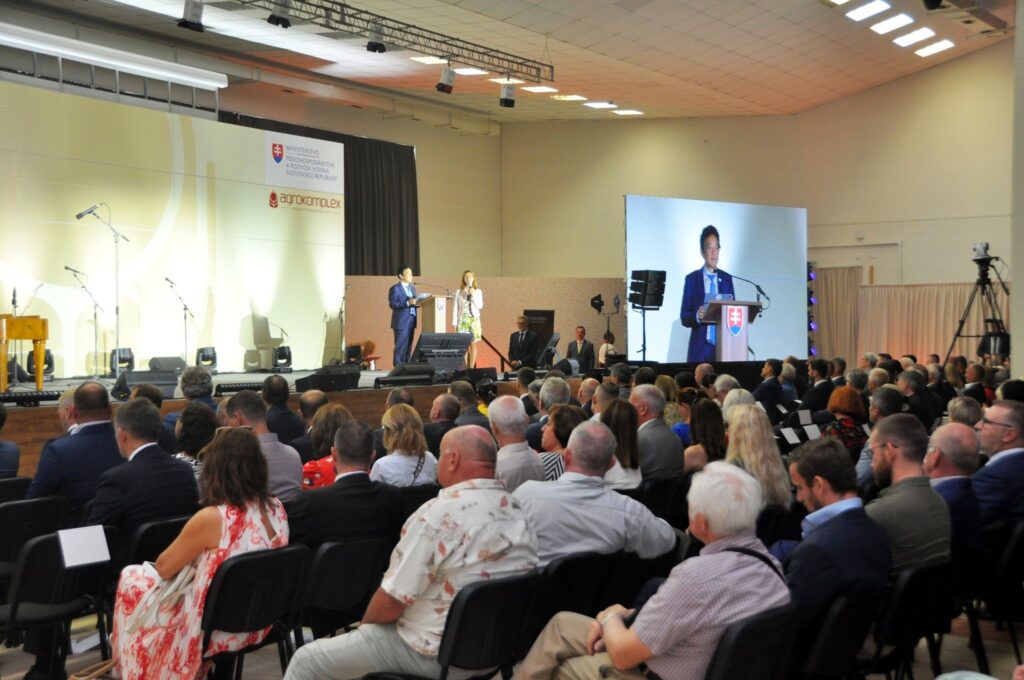
Director General of FAO Qu Dongyu delivering a speech at AGROKOMPLEX 2024

SUA’s communication activities involved discussions with various visitors, and presenting the NENUPHAR project leaflets and banners.
SUA in Nitra rewards outstanding employees
In October, SUA awarded the prize for the international scientific project with the highest allocation of funds in 2023 to Professor Ľuboš Jurík from the Faculty of Horticulture and Landscape Engineering for the NENUPHAR project. This is only one of the multiple ways the university shows support and interest for the project and its outcomes. Congratulations, Ľuboš!

The rector of SUA in Nitra Assoc. Prof. Klaudia Halászová (first left) posing with Prof. Ľuboš Jurík (second from left) and other rewarded employees during the award ceremony
More field trips in Slovakia
In June, SUA-UF organized the Field Day of Sustainable Agriculture in Kolíňany, Slovakia. An expert seminar and a tour of no-till plantations was prepared for participants. Professor Findura introduced the NENUPHAR project’s aims and role of SUA-UF within the Danube demo site focusing on the output of the project – developing biobased fertilizer for farmers obtained from dairy wastewater. He communicated the project also at another event – Day for Soil in Mlyňany Arboretum in Vieska and Žitavou, Slovakia held back in October.

Pavol Findura (SUA-UF) presenting the roll-up at the event and communicating the SUA-UF role in the NENUPHAR project
High level advocacy
NRDA, one of NENUPHAR’s Lithuanian partners – took the opportunity to visit the European Economic and Social Committee (EESC), where it secured a meeting with EU policymaker Alfredas Jonuška to present a number of projects including NENUPHAR, and their relevance, expected results and future benefits for a number of sectors and stakeholders. Great to see the NENUPHAR name reaching policymakers!

NENUPHAR in Brussels!
In September, partners of NENUPHAR came together for their 1st General Assembly in Brussels. No fewer than 35 members joined on-site and online to discuss the results so far and a common strategy forward.
Challenges and outcomes of this first year of work range from data gaps, stakeholder involvement (especially farmers), technological issues, lack of consistency in methodologies, inadequate harmonization of governance structures at the local level and the absence of economic and policy instruments at EU and local levels.
These same themes were also the subject of extensive discussions at the 5th ESNI Conference held on 18-19 September in Brussels.
The ESNI Conference was a brilliant occasion for NENUPHAR to present its activities (including scientific poster sessions and a workshop), engage in other workshops and get to know other projects and stakeholders to exchange views and start creating the diverse coalition we so urgently need.
The workshop organized by CIRCE, lead partner of NENUPHAR and supported by various partners, aimed at assessing the regulatory and economic instruments for nutrient recovery from manure, sewage sludge and dairy wastewater including in countries or MS that are not covered by the project.
We welcomed more than 50 participants from all around the world – from all over Europe to Asia and from the MENA region to Latin America.
What’s in the pipeline?
In the coming months, partners involved in each demo site (Ebro river basin, Lielupe river basin and Danube river basin) will organize workshops at the local level to maximize engagement and buy-in on the advanced solutions being developed.
Stay tuned on our social media channels and website to discover more on NENUPHAR events and news.
Discover more on NENUPHAR and follow our activities on LinkedIn or X. Stay tuned for more updates on how our partners’ projects are going by visiting our YouTube channel: NenuPhar_EU.
And last but not least, help us to create a more sustainable and healthy agriculture and environment by sharing experiences and good practices in joining the Community of Interest!
By also subscribing to the CoI, you will have the chance to receive updates, events and invitations and be part of a bigger coalition of practitioners and decision-makers in the field of nutrient management worldwide.
Partnering up!

In our first year, we’ve got our name out there! Joining forces with other Sister Projects, we continue to widen our reach. Check out our new partner projects across Europe and how they’re working to fight nutrient pollution and shape the circular future we’re all aiming for!
FER-PLAY is a Horizon Europe project (2022-2025) which facilitates the uptake of alternative fertilizers to protect ecosystems, decrease EU dependence on fertilizer imports, foster circularity and improve soil health. The project mapped and assessed circular fertilizers made from secondary raw materials, such as manure or biowaste, highlighting their multiple benefits in order to promote their wide-scale production and use in the field.
These documents outline key findings to support the uptake of circular fertilizer and are available in the project’s Resources webpage. Discover more on this project by following it on LinkedIn and stay tuned for more videos by following the FER-PLAY playlist.
NUTRI-KNOW aims to improve nutrient management practices in European agriculture through practical solutions. By collecting and translating innovative insights from various Operational Groups, NUTRI-KNOW provides farmers with accessible, actionable knowledge. The project encourages a hands-on approach to sustainable nutrient management through targeted knowledge exchange between farmers, researchers, and practitioners.
All materials from NUTRI-KNOW are freely accessible on the NUTRI-KNOW website and through EU-FarmBook.
SOILUTIONS aims to provide sustainable alternatives derived from biowaste, utilizing a circular economy approach. Within the project, partners will validate and optimize four value chains to produce at least five market-ready biowaste soil improvers.
Living Labs will be established in Flanders, Valencia and Murcia to ensure the developed soil improvers answer the needs of the market and are compliant with regulatory and societal expectations. Follow them here!
SYNECOis a project in Malta currently being carried out by the Farmers Central Cooperative Society (FCCS) in close collaboration with cow and pig cooperatives. FCCS is the largest fruit and vegetable farmers’ cooperative in Malta, and has recently embarked on a research project, financed by the European Union to recycle manure nutrients for fertilizing.
Through SYNECO, the FCCS will make the farmer a protagonist to help shape the future agricultural economic model. SYNECO will exploit the nutrients from the slurry and at the same time challenge climate and environmental issues more forcefully and directly. Explore their work here (and here for socials!) More to come in the next weeks, visit our website often to get the latest partnerships updates and joint activities!
